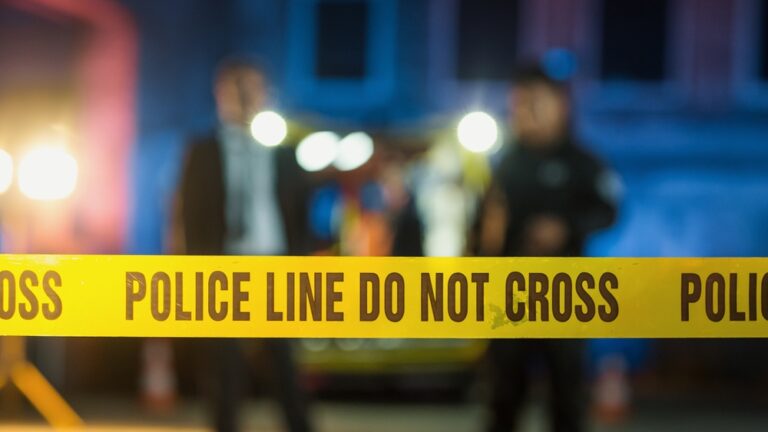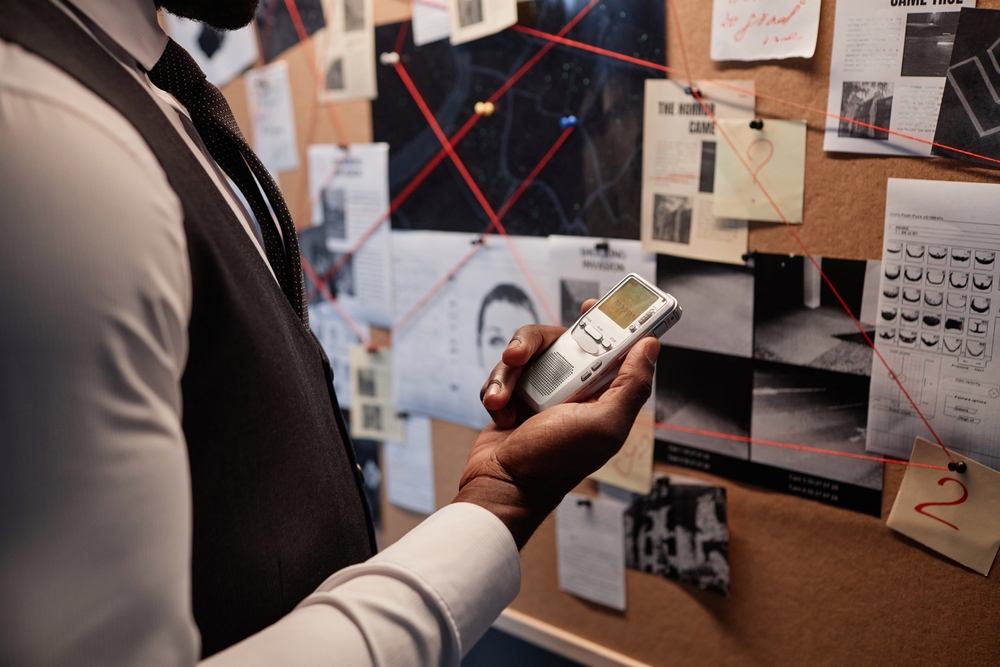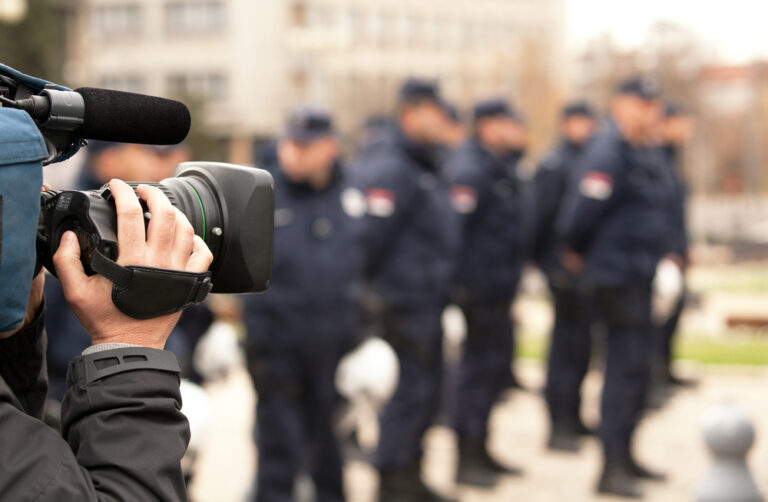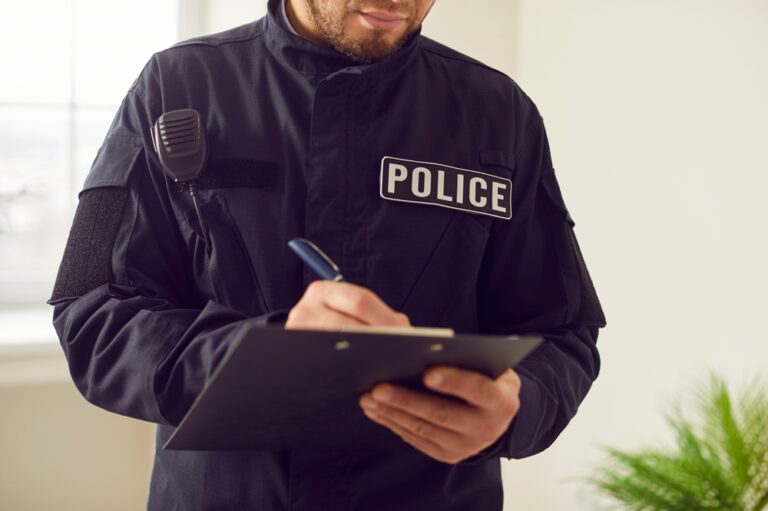
Police Tape 101: Everything You Need to Know
Police tape, commonly known as crime scene tape, is an important tool used by law enforcement to secure…

Every police officer should have a voice recorder (also known as an audio recorder).
Although many cops wear body cams, these body cams do not record all the time. When the body cam is initiated, the first 30 seconds are muted.
In addition, there isn’t a guarantee that the voice recorder is operable or records in a less than ideal quality. The body cam is carried by the officer at all times and has to withstand all types of temperatures. Can you imagine the type of beating the body cam takes from time to time?!
The officer’s voice recorder is kept secure in a holster. It is typically turned off and fully charged until needed. Most officer’s prefer to carry them in a bag that doesn’t get thrown around a lot.
Long story short, the officer may not have time to jot down notes at the moment and the body cam footage may help the officer document the incident at a later time. Plus, if an officer takes a statement from a suspect, he will have proof of what he/she may have said – the best documentation ever!
Now, a long answer.
Many people you meet may only give one statement to the police. This could be for a number of reasons. Here are a few examples below:
Psychology states that a witness to a crime has the very best recollection of an event immediately after the event has happened. Getting a statement as early as possible is the key to obtaining the most reliable information from a witness/and or witnesses. Recording a witness statement after an incident will surely produce a high-quality piece of evidence (which will be very useful in the investigation).
If you’re taking a witness statement in a serious case (or any case for that matter), you should listen to the recording of the statement when writing your report. In my experience, listening to statements gives you more distinct information than just jotting down random keywords in a notebook.
In some cases, recorded statements can be played in court. Recorded statements may reduce controversy around what was said and how it was said.
As stated above, you can record a suspect’s statement. However, you have to read them the famous Miranda rights. They are as follows:
“You have the right to remain silent. Anything you say can be used against you in court. You have the right to talk to a lawyer for advice before we ask you any questions. You have the right to have a lawyer with you during questioning. If you cannot afford a lawyer, one will be appointed for you before any questioning if you wish. If you decide to answer questions now without a lawyer present, you have the right to stop answering at any time.”
I can not stress this enough – reading these rights is not enough! You have to make sure that the suspect is in a state of mind where they fully understand the given rights. That means they cannot be intoxicated or have a mental condition which hinders them from understanding.
Most law enforcement agencies have suspects sign a written waiver where they voluntarily waive their Miranda rights. You should record this entire process in the event you have to prove that there was no coercion or any types of foul play.
Failing to provide the Miranda rights correctly can lead to the statement being inadmissible in court.You do not want this to happen. It can ruin an investigation.
Note: There are some state differences regarding what the Miranda rights must contain. Do your research.
You can read more about Miranda Rights here.
There is no easy answer to this, but I will try to give a simple explanation.
The police need a warrant to bug a house, car, or phone as a main rule. A patrol officer can’t just hide a voice recorder in a car, in hopes that someone will admit to doing something illegal. You can check out the federal code that addresses this issue here.
As I stated earlier, many police officers record events with their body cam. This means they are recording encounters with the public without explicitly telling the individual that they are recording.
This is also the case for voice recorders. Officer’s can have voice recorders turned on during encounters with civilians without informing them. The term “secret recording” is a matter of definition.
To put it simply:
Depending on state laws, in most cases, the police can record routine encounters with civilians where they are participating themselves. They can not spy on people at their discretion.
Phones are not secure enough.
Your phone’s cloud storage may be enabled. If this function is enabled, a witness’ personal information could be at risk. To add, they may give a statement that contains sensitive information. It could even be stored on servers where you have no control of the information.
In a moment of weakness, you could easily give access to a shady app. If so, this app will have permission to access your sound recordings. A person with bad intentions could even get a hold of them.
We allow people to use our phones at times. It could be a significant other, sibling, child, etc. What if they listened to them? The best-case scenario is that they only listen to them (which violates the recorded person’s privacy in itself). The worst-case scenario might be that recording(s) get spread around.
If you are interested in information security, read more about it here.
That depends on what you need. A reliable voice recorder is not cheap, but there are options.
You can find a reliable voice recorder for under $100. You may be wondering, is this really a “budget” recorder? There are cheaper alternatives, but I haven’t tried any of them.
My experience is that the renowned electronic brands are the most reliable when used year after year.
My recommendation is the Sony UX570. This audio recorder has a 4 GB memory and can hold over 150 hours of recording. If you want to add more memory, you can buy a SD card. It also has Auto Voice Recording mode which reduces background noise and enhances voice frequencies.
If you get this one, I encourage you to frequently transfer your files to a computer. The USB transfer is not the fastest, and it might take a while to move several large files from the recorder to your digital storage.
If you are like me and are concerned with information security, it would be best if you got a recorder that puts security at the forefront. The Olympus DS-9500 voice recorder includes Olympus Dictation Management System, which is software you install on your computer. In turn, this lets you enable encryption on your files and password protects the device itself.
This recorder is often used in cases with high sensitivity where the identity of the person being recorded is critical to shield. Get it on Amazon here.
I believe that every cop will be equipped with their encrypted voice recorder in the future. Until then, we all have to take special responsibility for the information we are entrusted with.
If you’re in law enforcement and don’t own a voice recorder, you should get one. In my opinion, it is the single best tool to avoid severe mistakes from being made early on in an investigation.
You never know what situation you’ll end up in when you’re sent to what seems to be a routine assignment. The witness statement you took immediately after an incident might be the piece of evidence that gets a murderer sentenced to prison or an innocent person acquitted.
For more information about police gear, see our articles about important items you need as a police officer and patrol bag contents.

Police tape, commonly known as crime scene tape, is an important tool used by law enforcement to secure…

The police are called daily regarding various incidents of public interest. It is our responsibility to provide the…

Many police officers experience terrible, traumatic events in the line of duty. A significant number of police officers…